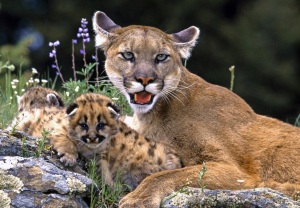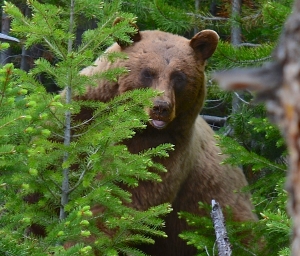 The JLT Natural History Society sponsored a presentation on “Coexisting with Large Carnivores on the Olympic Peninsula and across Washington” on January 23, 2014, by Lorna Smith, Executive Director of Western Wildlife Outreach (WWO) and Darrell Smith, WWO Wildlife Biologist. The talk was illustrated with the couple’s photos of the State’s four top carnivores—grizzly bear, black bear, cougar, and gray wolf—in their natural habitats. The event was held at the Cotton Building (607 Water Street) in Port Townsend.
The JLT Natural History Society sponsored a presentation on “Coexisting with Large Carnivores on the Olympic Peninsula and across Washington” on January 23, 2014, by Lorna Smith, Executive Director of Western Wildlife Outreach (WWO) and Darrell Smith, WWO Wildlife Biologist. The talk was illustrated with the couple’s photos of the State’s four top carnivores—grizzly bear, black bear, cougar, and gray wolf—in their natural habitats. The event was held at the Cotton Building (607 Water Street) in Port Townsend.

“Large carnivores such as bears, cougars, and wolves are highly controversial in a world now almost completely managed by humans, and people may question whether they belong now in ‘our’ world,” Lorna Smith says. However, these animals play critical and underappreciated roles in maintaining healthy ecosystems and balanced natural environments, and when their populations decline or are wiped out profound environmental impacts occur. “These mammals were all but eliminated from the Lower 48 by the late 1930’s and early ‘40’s, she says. “Their absence has caused overpopulations of prey animals such as elk and deer, the spread of disease among these animals, and radically altered landscapes in many, many places.”
 The Smiths shared historical perspectives on changes in large carnivore populations around the Olympic Peninsula. As the number of black bears and cougars has slowly increased to more natural levels during recent decades, human encounters with them have become more frequent, so the presenters also addressed how to live, recreate, and work safely in cougar and bear country. They also discussed the status of Washington’s gray wolf population, newly established in the State after an absence of almost 70 years.
The Smiths shared historical perspectives on changes in large carnivore populations around the Olympic Peninsula. As the number of black bears and cougars has slowly increased to more natural levels during recent decades, human encounters with them have become more frequent, so the presenters also addressed how to live, recreate, and work safely in cougar and bear country. They also discussed the status of Washington’s gray wolf population, newly established in the State after an absence of almost 70 years.
The nonprofit Western Wildlife Outreach is dedicated to providing accurate, science-based information on bears, wolves, and cougars. The organization aims to promote wildlife-safe communities, at the same time striving to restore and maintain healthy populations of these iconic animals, whose roots in the Pacific Northwest extend to millions of years ago.
This presentation was free and open to the public. Donations were appreciated to help defray the costs.